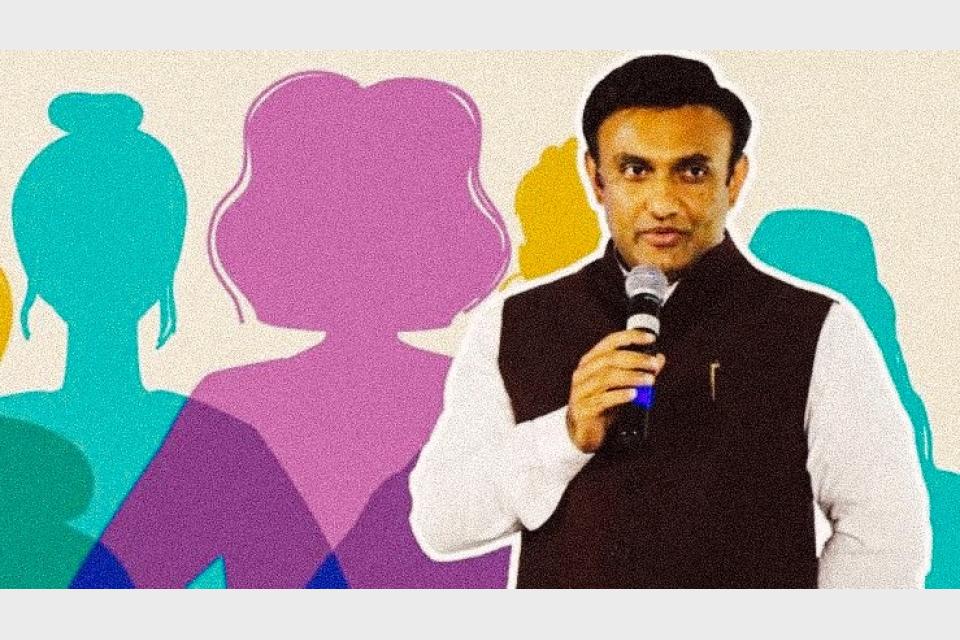Karnataka health minister K. Sudhakar raked up a controversy on October 10 by claiming that modern Indian women want to stay single, are unwilling to give birth even after marriage and desire children by surrogacy.
“Today, I am sorry to say this, lots of modern women in India want to stay single. Even if they get married, they don’t want to give birth. They want surrogacy. So there is a paradigm shift in our thinking, which is not good,” he said during the World Mental Health Day at the National Institute of Mental Health and Neurological Sciences (NIMHANS).
Lamenting the “western influence” on Indian society, the minister said people are not willing to let their parents be with them.
“Unfortunately, today we are going in a western way. We don’t want our parents to live with us, forget about grandparents being with us,” the minister said.
Sexist and misogynistic remarks made by Indian politicians are not uncommon.
In the second-most populous country, where motherhood is glorified by society and in literature and films, women are increasingly choosing not to have children.
A paper titled ‘Changing Role of Female Education on Fertility in India‘ by Namrata Mondal, Chander Shekhar and Dewaram A. Nagdeve says that there is a negative relationship between women’s education and fertility. It further says that education plays an important role in fertility decline by increasing age at marriage which reduces effective reproductive span, increases work participation and contraceptive use among women.
In India, according to the Sample Registration System (SRS) compiled by the Registrar General of India for 2017, the total fertility rate declined to an all-time low of 2.2 in 2017 after being stable at 2.3 for the four years from 2013 to 2016.
The Economic Times had reported the SRS findings that indicated that the average fertility rate went down primarily in southern states such as Tamil Nadu (1.6), Andhra Pradesh (1.6), Telangana (1.7), Kerala (1.7) and Karnataka (1.7) as well as the hill states — Jammu and Kashmir (1.6), Himachal Pradesh (1.6) and Uttarakhand (1.9). Delhi (1.5), West Bengal (1.6) Punjab (1.6) and Odisha (1.9) — too remained below the national total fertility rate in 2017. (SRS is the largest demographic survey in the country which provides annual estimates of fertility as well as mortality indicators at the state and national level.)
The 2017 Global Burden of Disease Study reported that the global fertility rate has been cut in half since 1950. A Vogue piece cited this study and another analysis of 33 studies of ‘fertility intentions’ in developed countries which found that roughly one-fifth to one-third of women who become pregnant aren’t sure whether or not they actually want a baby.
Although there are multiple reasons like education, financial independence, environmental concerns etc. attributed to women choosing not to have children, or rather adopt than giving birth, the societal stigma surrounding women making such choices remains.
One of the reasons the Vogue report said for not having children was the “increase in working women — and female breadwinners — around the world has also left many reluctant to leave jobs that aren’t always guaranteed to be there when they return”. A 2021 study titled ‘Predicament Of Returning Mothers‘, conducted by Ashoka University’s Genpact Centre for Women Leadership, found that women returning to work post-pregnancy face both subtle and blatant discrimination, including indifference at the workplace, lack of family support and societal pressures.
Psychologist Dr Sarah Gundle, co-clinical director at Manhattan “behavioural health studio” Octave told Vogue, “Women now have more choices, and for many, it’s a choice like any other choice. But the idea of women [having children] is still so deeply ingrained in our collective consciousness that women who choose not to are often seen as a little suspect.”
Leslie Ashburn-Nardo, the author of a 2017 study published in the journal Sex Roles, told the magazine: “Voluntarily child-free people elicited moral outrage —anger, disgust, disappointment — relative to people with children. They were also seen as less psychologically fulfilled.”
Gundle added that having children does not actually make people happier. She cited a 2016 study published in the American Journal of Sociology which looked at families in 22 European and English-speaking countries and found that having children makes people significantly less happy compared to people who don’t have kids. Researchers call this phenomenon the “parenting happiness gap”.









